
-
Finde das richtige Futter für dein TierFülle den Fragebogen aus und finde das passende Futter für deine vierbeinigen LieblingFinde das richtige Futter für dein TierFülle den Fragebogen aus und finde das passende Futter für deine vierbeinigen LieblingZugehörige Produkte
 Hypoallergenic Small & Mini Hundefutter
Hypoallergenic Small & Mini HundefutterHILL'S SCIENCE PLAN Hypoallergenic Small & Mini Adult Hundefutter mit Lachs ist ein Alleinfuttermittel für erwachsene Hunde kleiner Rassen im Alter von 1-6 Jahren. Es wurde entwickelt für Hunde mit empfindlicher Haut und empfindlichem Magen, mit einer begrenzten Anzahl an hochwertigen, neuartigen Proteinquellen und ohne Getreide.
Shop Now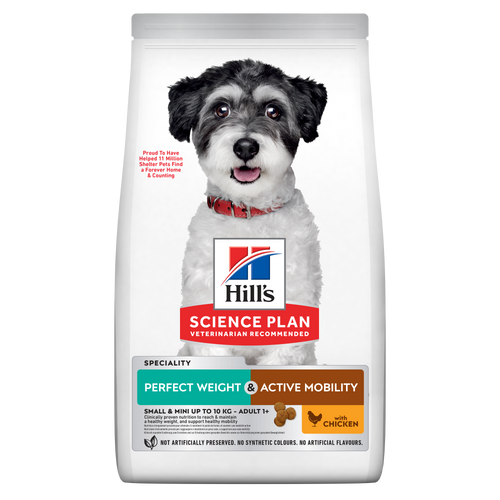 Perfect Weight + Active Mobility Hundefutter
Perfect Weight + Active Mobility HundefutterKlinisch erprobte Ernährung zum Erreichen und zur Erhaltung eines gesundes Gewichts sowie zur Unterstützung einer gesunden Beweglichkeit
Shop Now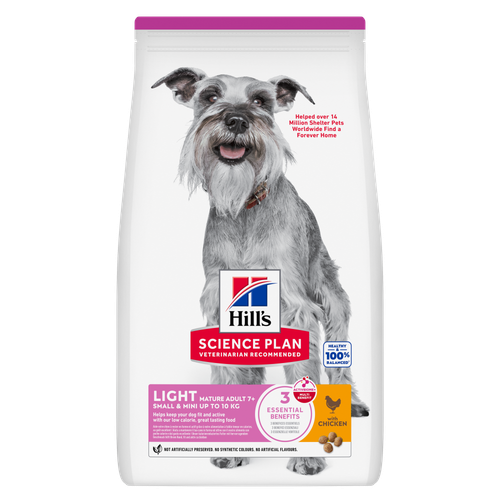 Light Small & Mini Mature Adult Hundefutter
Light Small & Mini Mature Adult HundefutterHill’s Science Plan Light Mature Adult Small & Mini Hundefutter mit Huhn ist ein Alleinfuttermittel, das speziell mit der ActivBiome+ Multi-Benefit-Technologie formuliert wurde.
Mit unserem kalorienarmen, wohlschmeckenden Futter bleibt dein Hund fit und aktiv.
Eine präzise Ernährung für weniger aktive ältere Hunde kleiner Rassen, die ein kalorienarmes Futter benötigen, das hilft, ein gesundes Gewicht zu halten.Shop NowHäufige DiagnosenZugehörige Produkte Light Adult Katzenfutter mit Huhn
Light Adult Katzenfutter mit HuhnZarte Stückchen Huhn in Soße für Katzen, mit L-Carnitin und weniger Kalorien für ein optimales Gewichtsmanagement. Voll an hochwertigem Protein, Omega-6-Fettsäuren und Vitamin E für glänzendes Fell und gesunde Haut.
Shop Now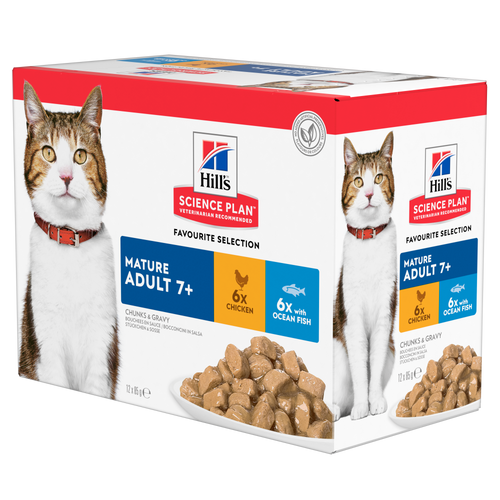 Mature Adult 7+ Multipack Nassfutter für Katzen
Mature Adult 7+ Multipack Nassfutter für KatzenZarte Stückchen in Soße für ältere Katzen. Hergestellt mit leicht verdaulichen Zutaten, hochwertigem Protein zur Erhaltung schlanker Muskeln sowie antioxidativem Vitamin C + E für optimale Gesundheit.
Shop Now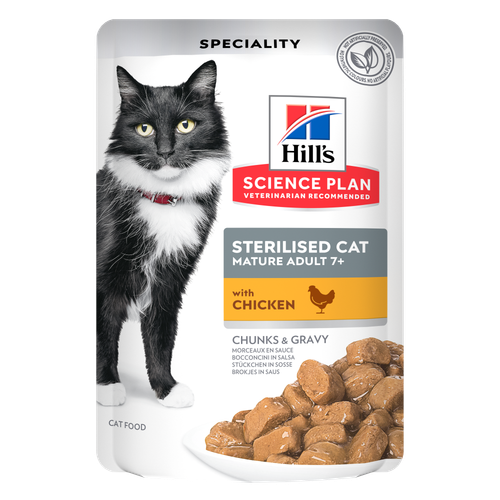 Sterilised Cat Mature Adult 7+ Nassfutter
Sterilised Cat Mature Adult 7+ NassfutterHill's Science Plan Sterilised Cat Mature Adult Nassfutter für Katzen mit Huhn ist ein Alleinfuttermittel für kastrierte Katzen ab einem Alter von 7 Jahren.
Shop Now -
Hund
- Tipps & Artikel zum Hund
-
Häufige Diagnosen Katze
- Gewicht
- Haut & Futtemittelempfindlichkeiten
- Harnwege
- Verdauung
- Gelenke
- Niere
- Genesung
- Zahnpflege
-
Lebensphasen - Hunde
- Ernährung von Welpen
- Ernährung von erwachsenen Hunden
- Ernährung von älteren Hunden
Katze- Tipps & Artikel zur Katze
-
Häufige Diagnosen Katze
- Gewicht
- Haut & Futtemittelempfindlichkeiten
- Harnwege
- Verdauung
- Niere
- Genesung
- Zahnpflege
- Stress
-
Lebensphasen - Katzen
- Ernährung von Kätzchen
- Ernährung von erwachsenen Katzen
- Ernährung von älteren Katzen
zugehörige Artikel Was Du über die Kalorien von Tierfutter wissen solltest
Was Du über die Kalorien von Tierfutter wissen solltestLerne festzustellen, wie viele Kalorien Dein Hund oder Deine Katze jeden Tag braucht, wie Du ihre Kalorien zählen kannst und was zu tun ist, wenn sie zu viele aufnehmen.
Read More Ein Leitfaden für Haustierbesitzer:innen für sichere Wasserquellen für Haustiere
Ein Leitfaden für Haustierbesitzer:innen für sichere Wasserquellen für HaustiereStelle die Flüssigkeitszufuhr Deines Haustiers sicher, mit unserem Leitfaden für Haustierbesitzer:innen für sichere Wasserquellen für Haustiere. Für weitere Tipps zur Aufrechterhaltung der Gesundheit Deines Haustiers besuche Hill’s.
Read More Dürfen Hunde und Katzen Butter fressen?
Dürfen Hunde und Katzen Butter fressen?Erfahre alles darüber, ob Butter für Deinen Hund oder Deine Katze unbedenklich ist und was zu tun ist, wenn Dein Vierbeiner sie frisst.
Read More -

 Wissenschaftlich basierte Ernährung macht den Unterschied, dem du vertrauen kannst
Wissenschaftlich basierte Ernährung macht den Unterschied, dem du vertrauen kannst
Verdauungsgesundheit bei Hunden
Verdauungsgesundheit bei Hunden
Was sind Verdauungsprobleme bei Hunden?
Eine Verdauungsstörung (oder Magen-Darm-Störung) ist jede gesundheitliche Situation, die verhindert, dass dein Hund seine Nahrung richtig verdaut oder die dazu führt, dass sich die Geschwindigkeit verändert, mit der die Nahrung den Verdauungstrakt passiert. Ignoriere die Anzeichen nicht! Wenn dein Vierbeiner Symptome einer Verdauungsstörung zeigt, solltest du dich sofort an deine Tierarztpraxis wenden.

Erkenne die Warnsignale
Einige Anzeichen für Verdauungsprobleme deines Hundes sind leicht zu erkennen. Wende dich unbedingt an deine Tierarztpraxis, wenn dein Hund eines dieser Anzeichen zeigt:








Erkenne die Warnsignale
Einige Anzeichen für Verdauungsprobleme deines Hundes sind leicht zu erkennen. Wende dich unbedingt an deine Tierarztpraxis, wenn dein Hund eines dieser Anzeichen zeigt:








Was verursacht Verdauungsprobleme bei Hunden?
Verdauungsstörungen können aus verschiedenen Gründen auftreten, und alle können dazu führen, dass sich Dein Hund nicht wohl fühlt. Hier sind einige der häufigsten Ursachen für Verdauungsprobleme bei Hunden.


Dies ist die häufigste Ursache für eine Magenverstimmung bei Hunden. Sie besteht in der Regel aus Erbrechen und Durchfall, der plötzlich einsetzt. Es kann aber auch nur Durchfall auftreten. Eine akute Gastroenteritis kann viele Ursachen haben, z. B. das Fressen von etwas "Ungewöhnlichem" (wir alle wissen, dass unsere Hunde das gerne tun!) oder Parasiten, Viren und Fremdkörper - um nur einige zu nennen.
Im Gegensatz zu den soeben erwähnten plötzlich auftretenden Erkrankungen treten chronische Darmerkrankungen langsamer auf und dauern in der Regel lange an. Durchfall und Gewichtsverlust sind häufige Anzeichen. Auch hier kann es viele verschiedene Ursachen geben, wie z. B. Futtermittelallergien oder genetische Faktoren.
Wenn sich der Kolon, der Hauptteil des Dickdarms, entzündet, spricht man von einer Kolitis. Sie ist in der Regel sehr charakteristisch und die meisten Hunde zeigen die gleichen Anzeichen: Sie sehen aus, als müssten sie dringend Kot absetzen, sie können sich beim Kotabsatz anstrengen, aber es kommt nicht viel heraus, und eines der klassischen Anzeichen für eine Kolitis ist frisches Blut und/oder Schleim im Stuhl.
Dies ist eine ernste Erkrankung bei Hunden und kann lebensbedrohlich sein. Häufige Anzeichen einer Bauchspeicheldrüsenentzündung sind plötzlich einsetzendes Erbrechen, Depression und Appetitlosigkeit. Es handelt sich außerdem um eine sehr schmerzhafte Erkrankung, so dass Dein Hund möglicherweise unruhig ist und sich bogenartig krümmt, um den Schmerz zu lindern. Wenn Du den Verdacht hast, dass Dein Hund eine Bauchspeicheldrüsenentzündung haben könnte, bringe ihn so schnell wie möglich in die Tierklinik.
Dieser kompliziert klingende Name beschreibt einen Zustand, bei dem Hunden bestimmte Enzyme fehlen, die für die Verdauung benötigt werden. Die Bauchspeicheldrüse produziert einige dieser Stoffe, und wenn sie fehlen, wird das Futter direkt durchgeleitet, ohne dass der Hund an die Nährstoffe gelangen kann. Hunde mit EPI neigen dazu, Heißhunger zu haben, verlieren aber trotzdem an Gewicht und sehen schlecht aus. Da sie Fett nicht gut verdauen, kann ihr Kot gräulich gefärbt sein. Einige Rassen, wie z. B. Deutsche Schäferhunde, sind dafür anfälliger als andere. In der Regel führt eine Ergänzung der Ernährung mit den fehlenden Enzymen zu einem guten Ergebnis.
Hunde können aus verschiedenen Gründen schlecht auf bestimmte Nahrungsmittel reagieren, die wir als Futtermittelallergien bezeichnen. Echte Lebensmittelallergien sind seltener, als man denkt, und sie werden häufig durch Proteine in Lebensmitteln wie Rind- und Hühnerfleisch verursacht. Futtermittelallergien können zu Erbrechen und Durchfall führen, aber auch zu Hautproblemen wie Juckreiz.
Genau wie bei Menschen fällt Hunden bei Verstopfung der Kotabsatz schwer, und sie gehen möglicherweise viel seltener auf die Toilette. Verstopfung kann durch viele Dinge verursacht werden. Der Verzehr von Knochen kann dazu führen, dass der Kot hart und schwer zu abzusetzen ist. Auch Dehydrierung oder ein träger Darm führen dazu, dass der Stuhl trocken und schwer zu abzusetzen ist.
Wie kannst Du helfen?
Wenn du den Verdacht hast, dass dein Hund an einer Verdauungsstörung leidet, solltest du zunächst mit deiner Tierarztpraxis über mögliche Behandlungen sprechen, die ihm helfen können. Du kannst deinem Hund zudem helfen, indem du die Anzahl der Stressauslöser in seiner Umgebung mit einigen dieser Vorschläge reduzierst:


Halte Routinen ein
Hunde lieben Vorhersehbarkeit. Wenn Dein Hund weiß, wann Du nach Hause kommst, wann es Essen gibt und wann es Zeit für einen Spaziergang ist, kann er seine Ängste auf ein Minimum reduzieren.


Ausstattung
Es gibt es eine Vielzahl von Produkten, die Deinen Hund beruhigen sollen. Bitte Deine Tierarztpraxis um eine Empfehlung, welche Hilfsmittel die Stressreaktion Deines Hundes in angstauslösenden Situationen lindern kann.


Die richtige Ernährung
Futter mit leicht verdaulichen Zutaten können magenschonend wirken. Frage Deinen Tierarzt, wie Du das Futter Deines Hundes umstellen kannst, ohne den Magen Deines Hundes weiter zu belasten.
Wie kannst Du helfen?
Wenn du den Verdacht hast, dass dein Hund an einer Verdauungsstörung leidet, solltest du zunächst mit deiner Tierarztpraxis über mögliche Behandlungen sprechen, die ihm helfen können. Du kannst deinem Hund zudem helfen, indem du die Anzahl der Stressauslöser in seiner Umgebung mit einigen dieser Vorschläge reduzierst:


Halte Routinen ein
Hunde lieben Vorhersehbarkeit. Wenn Dein Hund weiß, wann Du nach Hause kommst, wann es Essen gibt und wann es Zeit für einen Spaziergang ist, kann er seine Ängste auf ein Minimum reduzieren.


Ausstattung
Es gibt es eine Vielzahl von Produkten, die Deinen Hund beruhigen sollen. Bitte Deine Tierarztpraxis um eine Empfehlung, welche Hilfsmittel die Stressreaktion Deines Hundes in angstauslösenden Situationen lindern kann.


Die richtige Ernährung
Futter mit leicht verdaulichen Zutaten können magenschonend wirken. Frage Deinen Tierarzt, wie Du das Futter Deines Hundes umstellen kannst, ohne den Magen Deines Hundes weiter zu belasten.
Mehr Produkte
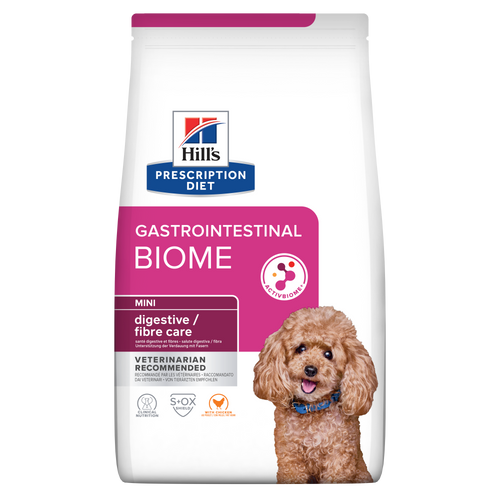
Hill's Prescription Diet Gastrointestinal Biome ist ein Trockenfutter für Hunde mit hohem Fasergehalt, das klinisch erwiesen hilft, weichen Kot in 24 Stunden zu festigen und das Risiko für ein erneutes Auftreten zu reduzieren. Hergestellt mit der ActivBiome+ Technologie zur raschen Versorgung des Darm-Mikrobioms und zur Unterstützung des Managements von komplexen Magen-Darm-Beschwerden.
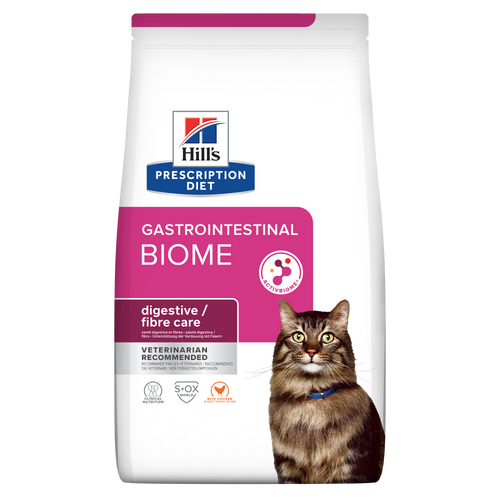
Hill's Prescription Diet Gastrointestinal Biome ist ein Trockenfutter für Katzen mit hohem Fasergehalt, das klinisch erwiesen in nur 24 Stunden einen regelmäßigen, gesunden Kotabsatz fördert und hilft, das Risiko für ein erneutes Auftreten zu reduzieren. Angereichert mit der ActivBiome+ Technologie zur raschen Versorgung des Darm-Mikrobioms und zur Unterstützung des Managements von komplexen Magen-Darm-Beschwerden.
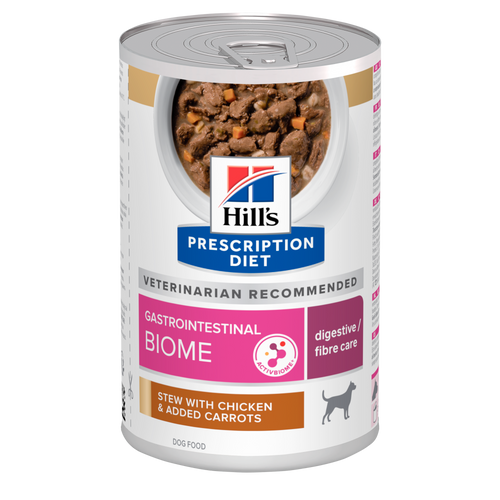
Hill's Prescription Diet Gastrointestinal Biome ist ein Nassfutter für Hunde mit hohem Fasergehalt, das klinisch erwiesen hilft, weichen Kot in 24 Stunden zu festigen und das Risiko für ein erneutes Auftreten zu reduzieren. Hergestellt mit der ActivBiome+ Technologie zur raschen Aktivierung des Darm-Mikrobioms und zur Unterstützung des Managements von komplexen Magen-Darm-Beschwerden.
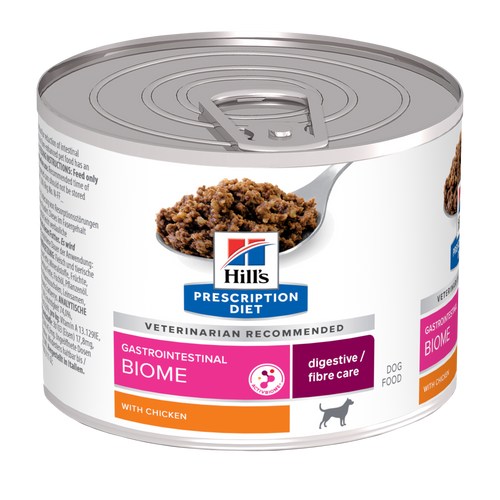
Hill’s Prescription Diet Gastrointestinal Biome ist ein Nassfutter für Hunde mit hohem Fasergehalt, das klinisch erwiesen hilft, weichen Kot in 24 Stunden zu festigen und das Risiko für ein erneutes Auftreten zu reduzieren. Hergestellt mit der ActivBiome+ Technologie zur raschen Aktivierung des Darm-Mikrobioms und zur Unterstützung des Managements von komplexen Magen-Darm-Beschwerden.
Weitere Informationen

Sind Bananen gut oder schlecht für Hunde? Erfahre, ob es sicher ist, Deinem Hund Bananen zu füttern und was zu tun ist, wenn er eine ganze Banane mitsamt Schale gegessen hat.

Es kommt häufig vor, dass Hunde schneller essen als Menschen. Erfahre, warum manche Hunde zu schnell fressen und welche gesundheitlichen Probleme dadurch entstehen können.

Finde heraus, was die beste Ernährung für kleine Hunderassen ist und was das perfekte Futter für ihre Gesundheit ist. Weitere Tipps für kleine Hunde findest Du bei Hill's.

Sie ist ein leckerer Snack, aber ist Ananas für Hunde sicher? Erfahre, welche Vor- und Nachteile Ananas für Deinen Hund mit sich bringt und wie Du sie sicher füttern kannst.